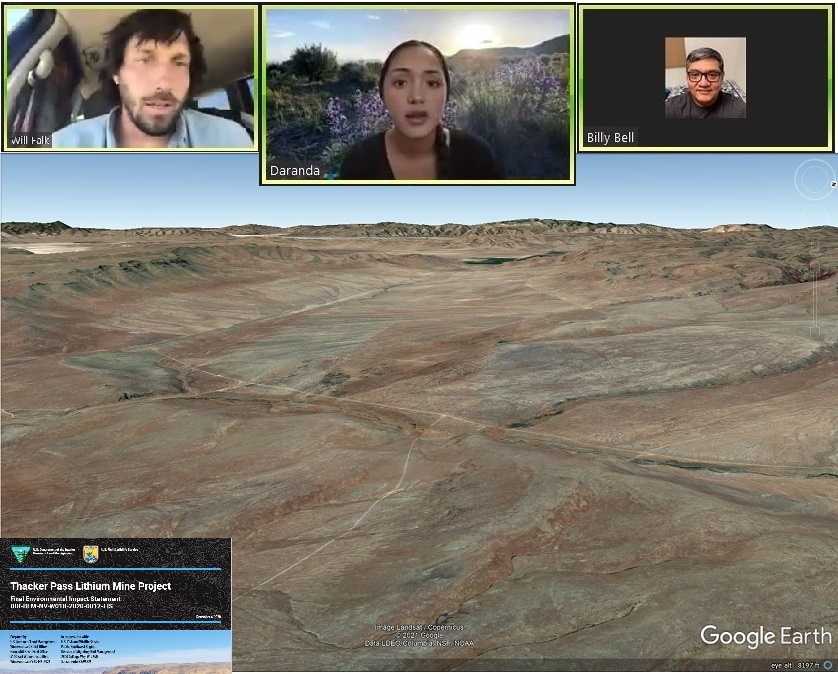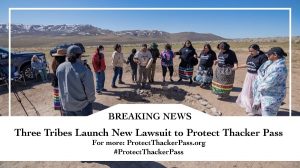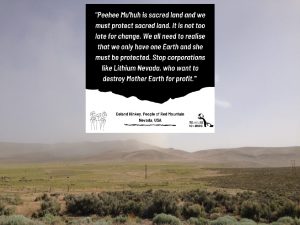Daranda and Will: Why we must protect Thacker Pass
8 min read
The amount of water that will be used and contaminated by the Thacker Pass lithium mine is an act of genocide, speakers said.
Daranda Hinkey, from the group People of Red Mountain, and Will Falk, a writer, lawyer, and environmental activist, encouraged allies to contact Secretary of the Interior Deb Haaland to Protect Thacker Pass.
Daranda Hinkey: My name’s Daranda Hinkey. I am a Fort McDermitt Tribal Member up in Northern Nevada. I’m also part of the People of Red Mountain Committee or, Atsa koodakuh wyh Nuwu.
I got involved with Thacker Pass, the past couple of, three months or so. I remember hearing about a lithium mine near our reservation and up in Northern Nevada. And that’s when I started doing my research. I started looking up lithium mines around the world, like Argentina, Bolivia, Chile.
And then I started looking up Lithium Nevada, who they were, what maps they had about Thacker Pass, what the exploration sites look like. And that’s when I found out about the EIS and how there wasn’t many public comments, or any public comments from our Tribe. And so that was pretty upsetting. What about other Tribal Members? Did they know? Was there talk about it? And that’s been a lot of the education that I, and my other family members, had to do with a lot of other People on our reservation. And that’s where it all started.
Thank you for supporting
local civic journalism
We decided that, Hey, we want more of a Tribal Member voice. And so that’s when we started the People of Red Mountain Committee. We want it to be heard. We wanted to stand up against this lithium mine, in any way that we can.
And so we also found out about another lithium mine, which is a lot closer to the reservation. That is Jindalee Resources Limited McDermitt Lithium Mine. On top of that, there was another proposed gold mine with Nevada Gold Mines. And so we were like, Hey, these people are coming for us. The corporations are coming for us. They’re bribing us with money and ways to help us with funding, which is— Yes, we do need the funding, but I feel as if it shouldn’t be in this way, that I want something good for our community, but not mining. Mining is not the answer. And so that’s just how I see it in my personal opinion. But, um, yeah, that’s how I got involved.
We’ve done a lot of raising awareness. We’ve done a prayer run. We’ve done a horse ride. We’ve also had a Reno gathering, this past Saturday. And so all of this is to raise awareness, for Thacker Pass Lithium Mine and to show people, Hey, this lithium mine is hurting the community, and we’re being used as a sacrifice zone. And that’s not fair because, to me, that’s threatening our Tribe, the language, the culture, all of it. And the amount of environmental concerns and impacts that this lithium mine and all the other lithium mines that they want to do is really alarming, because that threatens the next generation, and the next generation after that. And so, the Native People always said, ‘Think about your grandkids and their grandkids,’ and ‘Think about what the past would have said to you.’ And so this was all driving me to have an opposition against this lithium mine as well as try to get as many Tribal members and Indigenous allies and other non-Native allies involved in this campaign.
I think why I’m asking for help for Thacker Pass, or also known as Peehee mu’huh in Paiute, is, because these are ancestral homelands. A lot of the elders, they’ve been able to go up to Thacker Pass and they’ve shown and told stories about this place or the places around it. And so, without knowing that, those stories could possibly have been gone. And so just let that sit with you. That’s really scary to think about, that maybe I’m not asking the right questions. Maybe I should be asking more questions. Maybe I should be more involved.
And so I think that Thacker Pass and this lithium mine doesn’t just involve Thacker Pass and greenwashing lithium, but it involves a lot of other things on the reservation that need to be brought up: The environmental contamination of water, air, and the destruction of land. And to anybody that cares about Mother Earth, that is not okay, you know: We can not save our earth by destroying it. And it’s just as simple as that. And so we see this act of greenwashing. That needs to be addressed, and that needs to be changed.
And on top of that, we see how contamination of water and land and air, how that hurts culturally from a Tribal perspective. And the amount of water that the EIS is telling us that this lithium mine is going to take is 1.7 billion gallons of water per year. And to anybody that lives in this place, or just lives in a place where water is really precious, there is a drought, there’s been a continuous drought. And so on top of that, they want to take that much water from this beautiful area. It’s not okay.
And it’s going to be a destruction and a cultural genocide of the People if you take this much water, because not only are you taking water for the human aspect, but you’re taking water from the animals that we go and hunt. You’re going to take away the water for the plants and the medicines and the first foods that we go and gather. And so that’s important. I know a lot of People are worried about, we’re not using those tools anymore as much, but that’s why this is important. That’s why we need to continue doing these just traditional things, because with that, we have a purpose.
Thacker Pass is, yes, a lithium mine that we need to stop, or halt, but it’s also really important that we get a lot of more People on top of this, because it’s not just this one thing, it’s multiple things. Reconnecting with this land and the language and everything else that goes along with it gives the People a purpose. I have noticed, that with the past couple of months that we’ve been on this, it’s been connecting so many more family members and People, and we’ve had conversations about teachings and stories, and: ‘What did their grandparents do?’ ‘And what does our family tree look like?’ It’s just bringing all these questions and connecting with the People in so many more ways. That is so powerful, and the more People, the more allies, the more Tribal allies that we gain, the better this is going to go.
By protecting the land, we’re protecting ourselves, so I think we should really live up to that. I want to call out any Indigenous allies, other Tribal Councils, anybody out there coming in a good way to reach out to protect Thacker Pass: One Source Network, Progressive Leadership Alliance of Nevada, as well as the People of Red Mountain Committee. I think that’s really important to see if you can get involved. Our voices are really powerful and we can’t forget that.
Will Falk: [00:06:56]
Hello everyone. My name is Will Falk. I am a lawyer and a writer and an organizer with Protect Thacker Pass.
This (Thacker Pass lithium mine) project, quite simply, is a racist project. Since we’ve got up here, we’ve learned that, that this is a really important site, both for traditional uses for the Fort McDermitt Paiute and Shoshoni People, as well as many of the region’s Tribes. It’s also a place where there was a massacre.
Daranda explained this a little bit, but Thacker Pass is known to the Paiute as Peehee mu’huh, which means “rotten moon,” because there was a massacre here where People were massacred and their guts were strung out along the sagebrush. And when the hunters returned back to camp to find women, children, and elders massacred in Thacker Pass, they quickly realized how rotten everything seemed. And because Thacker Pass is shaped like a crescent moon, they called, they call it Peehee mu’huh.
This is an important thing to understand, and because if Lithium Nevada puts their mine over this, they will be covering up a massacre site. They’ll be making it impossible for People to return to this site and mourn their ancestors and understand what happened to their ancestors. And I’ve heard People describe the situation as, as similar to someone wanting to put a lithium mine over Pearl Harbor or Arlington National Cemetery or over the battlefield at Gettysburg. No one, no white person would think about putting a lithium mine over the battlefield at Gettysburg, and putting a lithium mine here in Peehee mu’huh is very similar to that.
We’ve also been hearing more and more that historically when soldiers came to round up People that a lot of People hid here in Thacker Pass. Thacker Pass provides a great view of approaches from both the east and west side. You could see soldiers coming from a long ways away, by the dust that they would make. And there are a lot of rocks and caves that People could hide in up here. And so if you destroy this place, you’re destroying a key part of the history of American genocide against Native Peoples. It’s really hard to come and understand the place if there’s a huge lithium mine all over it.
And I’ve started to think of this as, the federal government was responsible for so much genocide against Native Peoples, for rounding People up and putting them on reservations. And the Thacker Pass Lithium Mine would destroy the evidence of some of that genocide. It would destroy the evidence of a place where People had to hide because they were so scared of American soldiers. And I just really want us all to remember that, especially at a time when the new Joe Biden administration and his Secretary of the Interior Deb Haaland are paying a lot of lip service to “meaningful and robust consultation with Native Peoples.”
If they’re going to put any meaning to these new executive orders, to these new things that they’re saying, then they need to understand that there has not been an adequate government-to-government consultation with the Tribes in the region, with traditional folks who really understand Thacker Pass, and that needs to happen.
Daranda, Will, and Tribal Councilman Billy Bell appealed for help during a public Zoom session June 15, 2021. To contact Secretary of the Interior Deb Haaland about Thacker Pass, see the Department of the Interior website.







